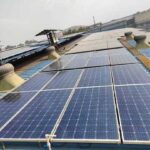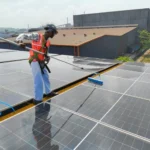How DISCOMs Implement Net Metering for Solar Power Plants
How DISCOMs Implement Net Metering for Solar Power Plants
Net metering is a critical dimension on the early and effective implementation of which depends the success of the grid-connected solar rooftop programme. SERCs of 19 States/UTs have notified regulations for net metering/feed-in-tariff mechanism, namely, Andhra Pradesh, Chhattisgarh, Delhi, Haryana, Karnataka, Kerala, Tamil Nadu, Uttarakhand and West Bengal, Andaman & Nicobar, Chandigarh, Dadra & Nagar Haveli, Daman & Diu, Lakshadweep, Pondicherry, Goa, UP, Rajasthan and Odisha. However, its implementation has so far been tardy which is impeding project development and deployment.
The following issues require urgent attention and action on the part of the discoms to expedite installations:
- Applications – Simplification of process with time-lines for inviting, processing and time-bound approval of applications, and registration of applicants
- Metering – Bidirectional net meters capable of recording both export and import of electricity should be procured in bulk, tested and provided by the discoms with cost to be borne by consumers, if necessary; alternatively, clear specifications need to be provided by the discoms, with list of approved suppliers alongwith price, in case they are to be procured by the consumers; to be followed by time-bound approval of installation and connectivity
- Distribution Transformers – The installation is required to be connected to a distribution transformer of the discom; limits are to be prescribed by the discom for the capacity of the installations to be connected as per the rated capacity of the concerned distribution transformer; the discoms should publicise a list of distribution transformers alongwith permissible capacity of installations that can be connected to each transformer
- Standards – The discoms need to ensure that relevant CEA Regulations and Standards on Inter-connectivity and Safety are followed and should provide time-bound clearance
- Billing and Accounting – Necessary procedures and mechanisms with associated software need to be put in place by each discom for billing and accounting of electricity (consumed/exported/imported/surplus carry forward) of the consumers having rooftop installations set up under different implementation modes
Discoms should create dedicated Cells within their set-up to provide single-point facility to installers and consumers relating to all aspects of implementation of net metering in their respective service areas. Training of discom officials could also be organized on technical and accounting aspects. Consumer awareness about solar rooftop, in general, and net metering, in particular, is another area that can be looked at.
Suggested Articles

Best Solar Panels for Rooftop Projects: How to Choose the Right One
Selecting the right solar panel is crucial for rooftop project success. This guide explains how to evaluate panel types, efficiency, warranties, and performance to ensure maximum power output and long-term savings for your home or business.

Latest 100 kW Solar Plant Price in Delhi | Subsidy, ROI & Payback
Thinking about installing a 100 kW solar system in Delhi? This 2025 guide breaks down the 100 kW Solar Plant Cost in Delhi, explaining price per watt, total investment, energy generation, and key benefits for industries and businesses.

Maintenance Of Solar Power Plant in India: Everything You Need to know
Proper maintenance is key to maximizing the efficiency and lifespan of solar power plants in India. Learn essential tips, best practices, and common maintenance tasks.

How to Calculate Savings from Rooftop Solar Solutions: A Complete Guide
Calculating savings from rooftop solar solutions is essential for planning your investment. This guide explains how to estimate cost reduction, return on investment, and long-term financial benefits for residential, commercial, and industrial solar projects.

What Is a Solar Power Generating System? | Complete Guide
A solar power generating system converts sunlight into electricity for residential, industrial, and commercial use. This blog explains the components, working, and benefits of solar systems, helping you understand how to harness solar energy efficiently and sustainably.

Monitoring Services for Solar Plants by Smart Roof Solar to Maximize Performance and Efficiency
Smart Roof Solar provides advanced monitoring services for solar plants to ensure maximum performance and efficiency. With real-time data tracking and intelligent analytics, our monitoring solutions help detect issues early, reduce downtime, and enhance the overall energy yield of your solar system.

Solar Energy for Industries Explained: Everything You Need to Know
Solar energy can greatly benefit industrial and factory owners as they require a constant and substantial source of electricity 24/7.

Net Metering and Its Advantages Explained: How Solar Users Save More on Energy Bills
Learn what Net Metering and its advantages mean for you—cut electricity costs, earn energy credits, and boost solar efficiency easily.